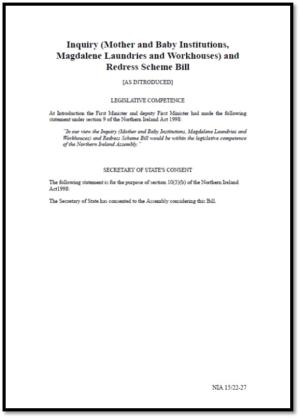
The Truth Recovery Independent Panel has welcomed the introduction of a new Bill at Stormont to establish a Statutory Public Inquiry and a Redress Scheme, marking a significant step forward in the Truth Recovery Programme for those impacted by Mother and Baby Homes, Magdalene Laundries and Workhouses (and associated pathways and practices) in Northern Ireland.
Public Inquiry
As the Panel nears the end of its own term, it notes that the publication of this long-awaited legislation is a further step towards truth and acknowledgement following years of sustained advocacy by victims and survivors.
The Panel continues to urge the Northern Ireland Executive to move swiftly to appoint a Chair for the Public Inquiry and reiterates the view it expressed in the public consultation that individuals with lived experience of the institutions under investigation should be appointed to the Public Inquiry.
The Panel also welcomes the new Bill’s provisions for a standardised payment redress scheme, alongside the commitment to establish a system of individualised payments following the conclusion of the Public Inquiry.
Redress Scheme
While the Panel supports the awarding of redress to individuals who were admitted to Mother and Baby Institutions and Magdalene Laundries between 1922 and 1995, it expresses concern at the exclusion of women, and their children, now adults, admitted to Workhouses before 1948. The Panel believe this elderly and relatively small cohort deserves recognition and justice, and that a fair and evidence-based mechanism can be developed to include them.
The Panel also strongly disagrees with the decision to limit posthumous awards to families of individuals who died after 29 September 2011. This date, tied to an unrelated decision on child abuse inquiries, has no bearing on the broader scope of the Truth Recovery Process (1922–1995). The Panel maintains that this approach is arbitrary and causes additional harm to families already affected. The Panel recommends a system of standardised payments for the immediate families of deceased victims. These symbolic payments should be made in the deceased's name to recognise both what happened to them, and the effects this had on their family.
The Panel does welcome several key decisions aligned with its own recommendations:
Future inclusion of other institutions: The Panel welcomes the Bill’s provision to allow for the future inclusion of other institutions based on recommendations by the Independent Panel or the Public Inquiry.
No minimum stay requirement: Ensuring survivors are not subjected to arbitrary eligibility conditions, as seen in the Republic of Ireland’s 180-day rule.
No requirement to waive legal rights: Victims and survivors will retain the right to pursue legal avenues alongside receiving redress.
- Standardised payments: The Panel welcomes the adoption of a system of standardised payments consistent with its submission to the public consultation in September 2024.The Panel recommends that the standardised payment amount should not be less than £15,000, to reflect recent increases in the cost of living.
Co-Chairs of the Independent Panel, Prof Leanne McCormick and Prof Sean O’Connell commented:
“We welcome this next stage in what has been a long process for victims and survivors. It is because of their tireless work and campaigning that we arrive at this milestone and we would like to pay tribute to their strength and perseverance over many years.
“Whilst we welcome much of the Bill’s provisions, we note with concern some omissions in the draft legislation including the exclusion of women, and their children, now adults, who were resident in workhouses before 1948, as well as the decision to limit posthumous awards to families of individuals who died after 29 September 2011. In our view, this date has no bearing on the broader scope of the Truth Recovery Programme.
“We acknowledge that many victims and survivors have raised similar concerns. As this legislation must now go through the legislative process at Stormont, we would encourage victims and survivors to make their views known to their local elected representatives and we would encourage MLAs at Stormont to listen to the voices of victims and survivors during this process.
“The Panel’s work continues and we are now writing our own report which will inform the work of the Public Inquiry once it is established. We would like to place on record our sincere thanks for those who have come forward to provide testimony and information to the Panel during its term. All of these contributions are critical to our final report and we are deeply grateful for those who have taken the time to so do.”
